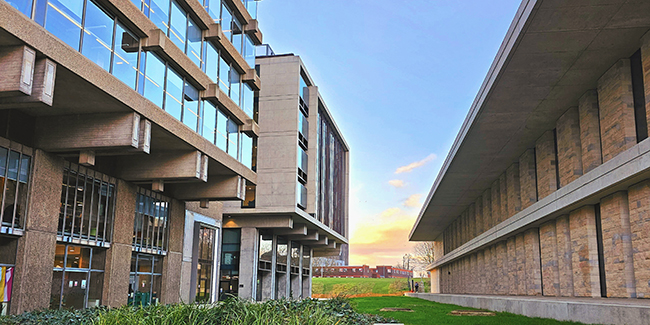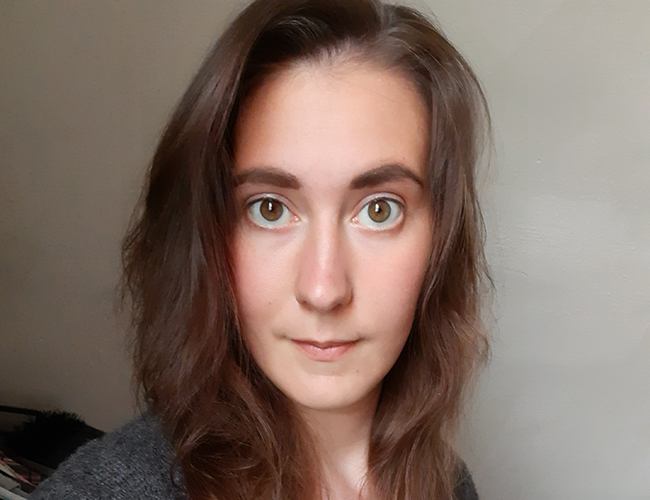
As part of our look at CILIP accredited courses we talk to Oona Ylinen, a part-time LIS student at UCL and Academic Support Librarian at University of Essex. Here she explains how she chose her course and her career and how an employer’s
support with flexible working hours opened the door.
Information Professional (IP): When and why did you decide to do a master’s?
Oona Ylinen (OY): I was studying Creative Writing at the University of Surrey but because study space was hard to come by on campus, I would study at the local public library. During one such study session in 2018, I saw a poster
advertising a part-time role in the library. I got the job, as a frontline library assistant, and decided on doing a master’s a few months into the role.
 Picture Oona Ylinen.
Picture Oona Ylinen.
I quickly recognised that librarianship provided a career option that plays to my personal strengths, whilst still supporting my writing goals and providing endless learning opportunities. I also found that the parts of the job that I
enjoyed the most would need a master’s if I wanted to take them further or understand more about the guiding principles behind them. (Like queries on the library management system, solving puzzles with missing stock or mysterious user
records, acquisitions, and collection management).
I gained more experience through a graduate traineeship at Gray’s Inn, one of the Inns of Court, where my interest in cataloguing and classification really sparked.
It took me two years to apply, because I’d been balancing the financial pressure of funding a master’s with having enough time to attend classes. I finally applied because my line manager in my post as a Content Assistant at University
of Surrey raised it as a CPD opportunity with support, if not financially, then from a flexible-working perspective. The flexible working arrangement meant I could work and study at the same time, which eased the financial pressure,
seeing as I had already done one master’s and couldn’t get funding or a loan for a second one. I did often feel I could do more for the team if I had studied the subject, so doing a master’s felt like the next logical step both in
my career and to satisfy my endless yearning to learn more about anything and everything that I find interesting.
IP: What did you hope the course would give you?
OY: By the time I applied, my interest in the course had shifted from general interest to wanting it to fulfil a very particular goal that would help me progress in my career. Firstly, I hoped to gain a more thorough understanding
of some of the theoretical perspectives and wider contexts that underline the day-to-day workflows – why things are done a certain way – so that I’d be able to contribute to workflow improvements and system migrations at my workplace.
This included the more philosophical debate about the future of libraries and librarianship, as rapid technological and digital advancements will mean changes.
Secondly, I hoped to gain practical skills and applications to complement the theoretical side. I am happy scouring the internet for research papers, but I knew that no amount of reading would replace teaching by qualified experts who
can contextualise research and help apply the knowledge in a practical setting.
IP: To what extent has it delivered this?
OY: The course at UCL has provided a good mix of theoretical and practical approaches as most lectures cover both aspects of a topic. The delivery is often split into lecture videos that explain the theoretical approach, followed
by a seminar/workshop that covers how the content from the lectures is applied in practice.
I can only speak for the course at UCL, but I’d guess this applies to most other LIS master’s programmes too: you get out what you put in. The staff are extremely knowledgeable and passionate and if you engage with the lecture and seminar
content, ask questions, participate in departmental events, and go along to webinars and training, you will be in a great position to learn so much in a short amount of time, not only from the lecturers but also from your peers, who
will likely come from a wide range of countries, cultural backgrounds and types of libraries.
IP: How has your masters helped with your career?
OY: I feel it has given me great insight into the context of librarianship as a field, allowing me to make informed career choices.
After the first term of my degree, I already felt like I’d solidified some of the skills I most urgently wanted to improve on, and I wanted to apply those skills in my work, so I felt ready for a move to a position with more responsibility.
Soon after the start of my course in September 2021 I moved to a Campus Library Manager post at New City College, a further education college with campuses all over East London and extending into Essex. I had responsibility for the
day-to-day operations of two campus libraries, contributing to college-wide collection management, buying and cataloguing new stock, delivering library skills training to students as well as line management responsibility for the staff
at my two libraries.
Although I enjoyed the added responsibility, I knew I couldn’t keep up a full-time job, a part-time master’s, playing for the baseball national team and three to four hours spent commuting every day for very long. As such, my master’s
is also directly responsible for me getting my current role at the University of Essex as an Academic Support Librarian for postgraduate taught students. I completed an Information Literacy optional module as part of the course which
sparked my interest in library roles more focused on teaching and liaison, both of which I had engaged with at a surface-level through delivering referencing training to Level 3 students and my collection management responsibilities.
The module helped me acquire the knowledge of frameworks and theories that I apply to perform my current role, so really, the course has had a very direct impact on my career.
IP: How did you choose your course?
OY: I spent time comparing LIS courses online. I looked at everything from fees, timetables, and modules to who was teaching the courses and what mode teaching would be delivered in. I knew I would prefer in-person teaching which
limited my geographic options, but I gave the distance courses a chance too, as it was more important to me that the course included a cataloguing and classification module that I could take, seeing as that was the area that I was
most interested in going into the course. I eventually chose UCL, based on the modules being the most interesting to me, the mode being hybrid, the location being accessible to me, as well as recommendations from several colleagues
in several different workplaces, which boosted my already positive image of UCL’s reputation. Some of the critique (or commentary, not all of it was critical) I’d heard of the UCL course was that it focused more on traditional library
skills, so seeing a core module (databases) that addressed technology, systems and how those are used in libraries showed to me that the department was aware of its reputation as a more “classic” LIS course and was trying to diversify
the skills on offer, which is the kind of awareness and adaptability that I knew I’d want from the course I apply to.
IP: What were the main factors in your choice of course?
OY: The main factor, really, was the fact that cataloguing and classification was offered as a core module with the opportunity to expand from base-level cataloguing and classification to knowledge organisation through an optional
module, which I felt would build on the foundations of classification. I also liked how clearly the digital and technological elements of various modules were highlighted in the module descriptions and I could envision how the whole
course would tie together to deliver this core set of skills that anyone entering a library career could be content with. I also attended a virtual open day where I met some of the teaching staff and was convinced by their passion
and attitude that echoed what I had been told about the course by my colleagues.
IP: How important do you think it was that the course was an accredited course?
OY: Since I was mainly doing the course to be able progress in my career, it being accredited was key. When I’d do wishful browsing for jobs that I’d like to do one day, many of them listed a CILIP-accredited LIS master’s as a necessary
requirement. I’m originally from Finland so I considered doing a remote course from home as that would’ve been free for me to do, but the Finnish courses aren’t accredited and many of the master’s level programmes are hard to get into
without having been through the undergraduate programme. I eventually concluded that a Finnish course being free didn’t offset the benefits of a full, accredited course that was much more straightforward to apply to.
IP: Do you have any tips or insights about the process of choosing a course for those about to embark on it?
OY: I think the crucial thing is to carefully consider why you’re interested in doing the course. All the courses had their merits and sounded interesting, but I obviously couldn’t do all of them, so if I’d sat down and articulated
to myself what I was hoping to gain from the course before I started looking them up, I might’ve saved quite a bit of time.
Calculate financial costs and time implications: university in the UK is not cheap and if your course is in person, you will have to pay for (usually peak time) train tickets, bring or pay for food, etc. which may not sound like a lot,
but will add up. Going to classes in person is also more of a time commitment than remote classes – working half days to accommodate in-person classes is unlikely to be as smooth as with remote classes.
I would argue that the benefit of meeting your lecturers in person, being able to sit down with your peers between or after classes and taking advantage of on-campus facilities (like one of UCL’s 21 libraries!) is worth the commute, but
that depends entirely on your circumstances. If you work on the side, you should also consider when you will have the time to do preparatory readings and class work, and how much time you can dedicate to doing coursework, whilst still
getting enough rest.
I’ve loved my course and I’d do it all over again if given the chance, so I wish good luck to anyone looking to apply for a LIS course – whichever course you choose, as long as you go in with eyes open and prepared, it will be the best
choice you’ve ever made.


 Picture Oona Ylinen.
Picture Oona Ylinen.
